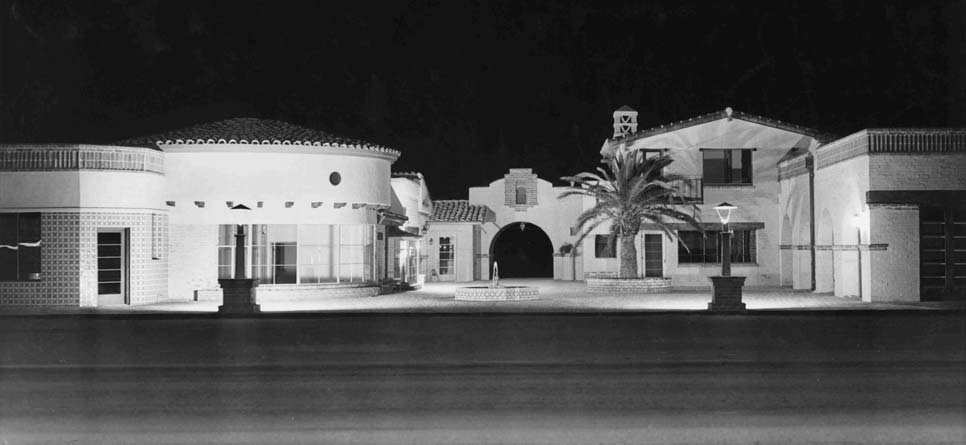TUCSON, ARIZ. – Broadway Village, heralded by local historians as Arizona’s first shopping center and one of Tucson’s most iconic architectural treasures, has quietly turned 75. Local owners plan a festive celebration of the three‐quarter‐century milestone later in 2015, according to Craig Finfrock of Commercial Retail Advisors, leasing agent for the center. Finfrock says the commemoration will most likely coincide with the opening of the center’s newest and long‐sought anchor tenant, Natural Grocers. The organic grocery store chain announced on January 8th that Broadway Village will be among four Tucson locations to open in the next 18 months.
Natural Grocers is a 60‐year‐old, publicly traded national chain that sells naturally raised meats, dairy and poultry, wild and sustainable fish, certified organic produce and household products that are natural, renewable, safe and nontoxic, according to its website. Natural Grocers’ lease agreement with Broadway Village, signed late last year, calls for occupancy of close to 15,000 square feet.
Built in 1939 by Helen and John Murphey at the southwest corner of Broadway and Country Club, Broadway Village remains the most successful and enduring commercial building designed by Tucson’s prolific mid‐century architect, Swiss‐born Josias Joesler, according to the 1994 booklet entitled Joesler & Murphey: An Architectural Legacy for Tucson, published with funding from the National Park Service.
The booklet’s contributors, including local expert R. Brooks Jeffery, Coordinator of Preservation Studies at the College of Architecture and Landscape Architecture, University of Arizona, suggest the Murphey’s found inspiration for Broadway Village on a visit to Patzcuaro, a quaint village in Central Mexico. With Joesler’s help, they recreated the village square at Broadway and Country Club, then on the outskirts of Tucson. Using Spanish Colonial Mission Revival forms, low‐pitched clay tile roofs, arched openings, carved niches, arcades, stairways, mortar‐washed brick, and colored ceramic tile, they crafted “a romantic sense of place” for locals and visitors alike to admire and enjoy.
Although cherished for its iconic Mission Revival architecture, historians claim that Broadway Village was also a pioneering retail concept in 1939. Situated far from the downtown shopping district, its plaza‐ style site plan was innovative, featuring parking in the rear. Its sculpted outdoor spaces were exposed to the streetscape of Broadway, inviting neighbors to shop and socialize throughout the scenic plaza.
In the evolution of retailing, Broadway Village was also a forerunner as one of the first grocery, drug, and hardware anchored shopping centers in the United States.
In January 2008, a group of local investors acquired Broadway Village from the Robert C. Murphey Trust. The Trust selected the owner to purchase the historic shopping center based on its retail expertise, local ties and commitment to serve as a responsible steward for the Tucson landmark. Holding true to this vision, the owner has kept its promise to restore the scenic Broadway Village, returning it to a bustling retail hub reminiscent of the 1940s and preserving Joesler’s iconic Spanish Colonial Mission Revival architecture for generations to come. Securing a specialty grocery store like Natural Grocers completes the vision set forth by Broadway Village’s current owners upon acquiring the property.
“The owners’ efforts to restore, reposition and enhance Broadway Village have been ongoing since 2008 to ensure a thriving center and meeting place for the neighborhoods of Broadmoor, Sam Hughes, Colonia Solana, and El Encanto, as well as a cherished shopping destination for Tucson residents and visitors for decades to come,” said Finfrock.

Above: Broadway Village appears today much as it did during this image from its early years. Its original anchor tenant, Broadway Village Market, is still fondly remembered by longtime Tucsonans for its freshly butchered meats and fish. An adjacent drug store with soda fountain was known for serving Green Rivers and Cowboy Burgers. These establishments closed their doors in the 1970s in the midst of Tucson’s mass suburbanization but the Broadway Village shopping center continues to thrive under local ownership committed to maintaining its important place in history, while adhering to current city codes.
